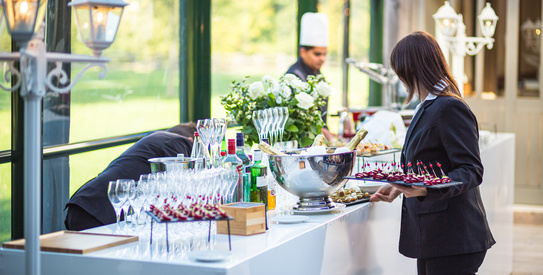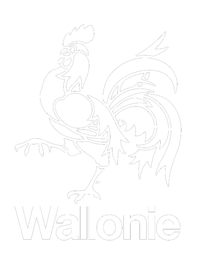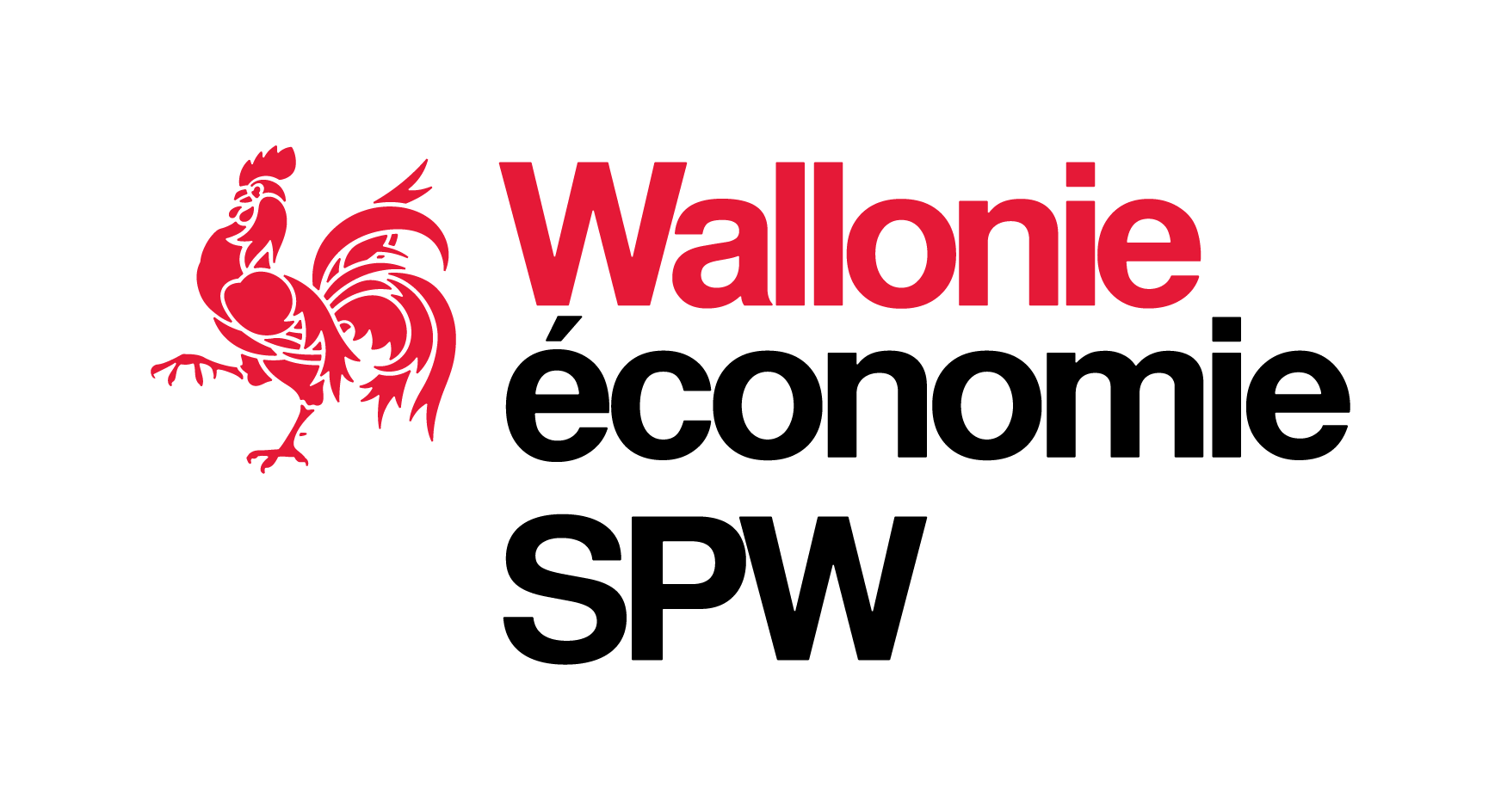Access to the profession of restaurateur, caterer and banquet organiser
Are you thinking of starting a catering business? Would you like to open a restaurant? Or are you planning to add any of these services to your existing business? In this case, you need to prove that you have the skills to start up such a business. If you don't have a diploma or experience in this field, you can obtain a certificate by sitting the central jury exam.

Which activities require professional skills as a restaurateur, caterer or banquet organiser?
By definition, this includes the preparation of hot or cold meals intended to:
- Be consumed on the premises;
- Be served by you, to order, outside the establishment.
Preparation includes any act by which a dish is:
- Made;
- Put together;
- Plated up;
- Reheated;
- Defrosted.
If in doubt, contact a Business Counter. They can advise you on your personal situation.
Which activities are exempt?
Access to the profession of restaurateur, caterer and banquet organiser is not required for the following activities:
- The following light meals if served with bread only:
- Soups;
- Toasted sandwiches and any kind of toast;
- Croquettes, except potato croquettes;
- Vol-au-vents;
- Black pudding and white pudding;
- Grilled kebabs;
- Filled rolls, hamburgers, hot dogs, pittas and croissants;
- Pasta, pizzas, quiches or other savoury pies;
- Cold salads;
- English plates;
- Prepared eggs;
- Desserts, including pancakes, ice cream, waffles, cakes, brioches, yogurts and milkshakes;
- If you are a butcher, fishmonger or game and poultry seller: your meat, fish or game and poultry preparations;
- Bakery, pastry, pancake and ice cream parlours;
- 'Friteries', or Belgian fries stands, subject to itinerant trade regulations;
- 'Friteries' for preparing the following in fat or oil:
- Potato fries;
- Dishes purchased ready for use;
- If you are a hotelier: breakfast;
- Retirement homes;
- Owners of automatic dispensers;
- General food retailers, for the sale of prepared meals;
- Family-run accommodation businesses and guest-house owners who serve meals exclusively to their guests.
- A family-run accommodation business is an accommodation business where the head of the family:
- Works alone;
- Works with their spouse;
- Works with their parents of first- or second-degree relatives;
- Works with an employee;
- Or works with an active partner.
- The hiring of one or two additional people for a maximum of two months per year does not entail the loss of family status.
- A guest-house is one or more furnished rooms forming part of the owner's personal and usual home and intended to be rented out for tourists.
- A family-run accommodation business is an accommodation business where the head of the family:
The following is not considered as preparation:
- The serving of sauces;
- The serving of spices;
- The cutting or addition of:
-
- Onions or preserved onions;
- Cucumbers;
- Pickles;
- Canned mussels;
- Cooked sausages served cold.
The regulations do not apply to the following dishes if they are served in disposable paper, cardboard or plastic packaging:
- Flemish beef stew;
- Goulash;
- Meatballs in tomato sauce.
If in doubt, contact a Business Counter. They can advise you on your personal situation.
- The following light meals if served with bread only:
How can I prove my skills?
Skills can be proven in two ways:
- With an educational or training diploma;
- With 5 years' uninterrupted professional experience over the past 10 years.
If you don't have either, you can obtain a certificate by sitting the exam for professional skills as a restaurateur, caterer or banquet organiser (20040) before the Central Jury.
Frequently asked questions about access to the profession
How do I know if my diploma grants me access to a profession?
A database of diplomas, degrees and certificates from all over the world helps you determine whether your qualifications meet entrepreneurial requirements. You can look up your diploma to find out which activities it gives you access to. If in doubt, contact a business counter. The Central Jury Service is not able to validate your qualifications.
Other than the company manager, who else can bring entrepreneurial skills to the business?
For a self-employed person (natural person), this person can be:
- A spouse;
- A legal cohabitant;
- A partner who has been cohabiting with the individual for at least 6 months;
- A self-employed assistant, parent or relative up to the third degree;
- An employee with a permanent employment contract.
For a business (legal entity), this person can be:
- The management body (e.g.: a manager of a limited liability company or a managing director of a public limited company);
- A company director (e.g.: an active partner in a limited liability company or a director of a public limited company);
- An employee with a permanent employment contract.
If in doubt, contact a Business Counter. They'll be able to tell you if you have the required skills for your activity.
What skills are tested on the exam? What content does the exam cover?
Raw materials
- Name, packaging, origin or manufacture, composition, properties;
- Raw materials regulation;
- Most frequently used accessories;
- Insofar as this knowledge is necessary to differentiate, assess, conserve and use the raw materials listed below:
- Meats and meat products, poultry, game, fish, molluscs and shellfish;
- Fruits and vegetables;
- Spices, condiments and herbs;
- Flours and starches;
- Fats;
- Milk and cheese;
- Eggs;
- Sugar;
- Coffee, tea, cocoa, chocolate;
- Water, beers, wines and spirits (aperitifs, liqueurs, natural eaux-de-vie).
Professional equipment
Kitchen
- Location of kitchen and annexes (pantry, vegetable stores, cold room and dishwasher);
- Installation and layout of the various premises;
- Name, description, operation, use, cleaning and maintenance of:
- Hand tools;
- Measuring, volume and weight instruments;
- Kitchen furniture;
- Collective equipment: stoves, ovens, grills, deep-fat fryers, salamander grills, heating cabinets, slicers, mincers, beating and grinding machines, all-purpose machines, peelers, cookware, refrigerators and freezers, dishwashers and other household utensils and appliances.
Restaurant
- Silverware: list of the main pieces, care and storage, advantages and disadvantages of the various materials used in their manufacture.
- Crockery: list of the main pieces, care and storage, advantages and disadvantages of the various materials used in their manufacture.
- Glassware: use and care of the main types of glass and water and wine carafes.
- Linen: main items of linen, economical use and protection of linen.
- Room furniture: naming, use and maintenance of tables and chairs, console tables, sideboards and trolleys; room layout according to circumstances.
- Miscellaneous equipment: name, use and maintenance of cash register, percolator, beer tap, ashtrays, cleaning, flower vases, etc.
Theory
- Cooking: basic concepts of the various physical, chemical and biochemical phenomena and their influence on the manufacture, cooking and preservation of products.
- Basic understanding of the nutritional requirements of the human body.
- Kitchen staff: composition of the team according to the type of restaurant; the tasks assigned to each person.
- Restaurant: the team: its composition according to the type of restaurant and the role of each member.
- Customer reception: politeness, friendliness, helpfulness, deference, good manners, tact and discipline.
- Provide information requested by customers on means of communication, entertainment and regional tourism.
Technology
- Kitchen:
- Culinary vocabulary;
- Implementation, use and preparation of raw materials;
- General cooking methods: cooking times, general cooking rules;
- Overview of the different stages in the preparation of mother sauces and fonds; soups and consommés;
- Overview of the different stages in the preparation and cooking of meat, fish and offal;
- Different dishes and their presentation;
- Restaurant patisserie: different types of pastry. Preparation recipes and a reasoned explanation of how the products are made.
- Restaurant:
- Definition of terms: fixed price, table d'hôte and à la carte;
- Definition, justification and knowledge of the various services;
- Service of a few special dishes (e.g. steak tartare, oysters, hors d'oeuvres and simple carving);
- The use and preparation of finger-bowls;
- Wine service;
- Clearing rules;
- Organisation of the commis waiter service, the commis waiter and their waiter station.
- The relationship between the restaurant and the kitchen:
- Orders forms (principle, drafting and use);
- Special cases (continued, returned);
- Concept of the time required to prepare à la carte dishes;
- The relationship between the restaurant and the bar, lobby, terrace and the cellar of the day.
Hygiene and occupational safety
- Cleanliness of body and clothing;
- Cleanliness of tools and business premises;
- Insect and rodent control, precautions when using disinfectants and insecticides;
- Cleanliness in the preparation and serving of culinary products;
- Precautions against cold, heat, dryness, humidity and dust;
- Fire safety measures;
- Eye care for working with ovens and in the kitchen;
- Basic knowledge of contagious diseases, alcoholism and its dangers;
- Legal regulations concerning the use of equipment and the installation of the kitchen and restaurant.
Basic legal concepts relating to the profession and various other subjects
- Brewery contracts;
- Professional organisation, professional ethics and, in particular, the rules accepted by the Joint Committee;
- Tax law relating to the profession;
- Civil liability in relation to customers;
- Tourism bodies and organisations.
How does the exam work?
The exam consists of a written questionnaire and an oral section before a jury.
Any questions? Any problems?
info.jurycentral.dgo6@spw.wallonie.be
Office hours:
Monday: 2 – 4pm
Tuesday: 2 – 4pm
Wednesday: 9am – 12pm
Friday: 9am – 12pm081/33.40.00
Our offices are located at:
Boulevard Cauchy 43
5000 NAMUR
Are you looking for other solutions for your project?

Receive personalised advice and quickly find the answers to your questions. Find the help you need on 1890.be.
Discover other solutionsOther state aid

Innovation, training, exports, consultancy... Take a look at all the state aid available to Walloon companies.
To the Midas database